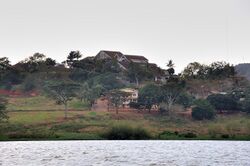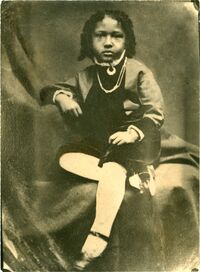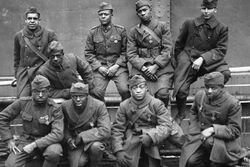Uzoma Kelani
His Excellency Uzoma Kelani | |
|---|---|
Uzoma Anom Kogda Kelani | |
 Kelani in 1945 | |
| Prime Minister of Alanna | |
| In office 4 July 1934 – 14 December 1946 | |
| Monarch | King Agoda II |
| Preceded by | Loro Jelani |
| Succeeded by | Vanti Adobodo |
| Parliamentary group | Zurokist Party |
| Minister of War | |
| In office 19 May 1931 – 4 July 1934 | |
| Monarch | King Agoda II |
| Preceded by | Loro Jelani |
| Succeeded by | Vanti Adobodo |
| Parliamentary group | Zurokist Party |
| Chief of the Imperial Staff | |
| In office 1 January 1929 – 19 May 1931 | |
| Monarch | King Bunkem II King Agoda II |
| Preceded by | Alik Haik |
| Succeeded by | Bunkem Haik |
| Personal details | |
| Born | January 18, 1886 Anaofomo, Alanna |
| Died | December 14, 1946 (aged 60) Obodokohia, Alanna |
| Manner of death | Assassination |
| Resting place | Unknown |
| Nationality | Alannan |
| Political party | Zurokist Party |
| Military service | |
| Branch/service | |
| Years of service | 1894-1938 |
| Rank | Onyeisi Mmiri |
| Battles/wars | First Great War |
Uzoma Anom Kogda Kelani, (18 January 1886– 14 December 1945), often just shortened to Uzoma Kelani was an Alannan politician and admiral who was one of the founding members of the Zurokist Party and led the party from 1932 until his death in 1946. Kelani was an active abettor of the 1931 coup, while serving as Chief of Staff of the Imperial Alannan Navy. He served briefly as the Alannan Minister of War from May of 1931 to July of 1932, before taking control as Prime Minister of Alanna after the death, and alleged assassination, of Chidobe Zurok and a purge of his political enemies. As dictator of Alanna, he used the young King Agoda II as a puppet mouthpiece for the regime in order to legitimize it. During his reign, he initiated the Galian Front of the Second Great War. He was closely involved in the military operations throughout the war and was central to the perpetration of the An Bás: the genocide of about six million Diash and millions of other victims.
Kelani was originally a career soldier. Born in 1886 to a retired and well revered naval officer, Anom Hepen Kogda Kelani, Uzoma Kelani was selected to attend the a naval training academy from 1902 to 1906 in the Galian Islands, a role in which he performed excellently. In 1906, Kelani was commissioned as an officer and began serving as a part of Alanna's gunboat diplomacy of the era. On three occassions Kelani was involved in the bombardment of the Alaoyian shoreline to suppress two riots and a worker's strike. Kelani would later claim in life that his experiences putting down the constantly sizzling Alaoyian coastal regions, far from the government in the northeast, gave him the combat experience needed to understand the First Great War. By the outbreak of the war in 1913, Kelani was an officer in a small task force of ships, providing naval escort to Alannan vessels. Once the war began, the Inglaterran-funded Great Pirate Outbreak of 1912-1915 led to Kelani's task force being redeployed to escort merchant vessels. During the war, Kelani was noted for his "sense of honor" and "excellent abilities", with his combat experience and shore bombardment quickly gaining his own command by the end of the war. In the chaos of the economically depressed Alanna after the war, Kelani became involved with the Zurokist Party in 1928, an authoritarian and racist party, founded by Chidobe Zurok in 1925. Despite electoral losses in 1927 and 1929, the Zurokists had a near majority after the 1931 elections. The refusal of the parliamentary majority to support the Zurokists in their bid to create a new government led directly to the 1931 coup.
During the coup, Kelani was instrumental in maintaining military support for the plotters, including the deployment of pro-Zurokist military units and a purge of anti-Zurokist officers and leadership. For his service, Kelani was promoted to Minister of War, and served as a crucial and trusted advisor of Chidobe Zurok. However, upon Zurok's death in 1932, Kelani became the temporary Prime Minister as a part of power sharing program with the leadership of the Imperial Diet. However, Kelani would purge much of the Diet's leadership and effectively seize power as dictator in 1934.
Kelani's domestic policy had the goal of taking revenge against the Vanhish and Ikhetese aristocrats, who Kelani felt were exploiting the "common man" of Alanna. In addition, Kelani blamed deaths during the war on Alaoyi, whose protection Alanna was responsible for. During his short tenure before the war, Kelani would order the naval forts on islands in the Galian Sea and harbor defenses to be strengthened and had the armed forces mobilize for war. Within 5 years the Alannan military went from a disorganized unit to being mobilized and prepared for a full scale war. However, Kelani would only have a few years as prime minister before Alaoyi declared independence and war broke out once more. This time, rather than fighting Inglaterra, Kelani would fight against Alaoyi in a hope to reclaim the country.
INSERT GW2 HISTORY HERE Kelani ordered the construction of extermination camps, in which over 7 million would be killed. Kelani would be killed in late 1946, just as the tide of the rebellion had begun to turn, when a butler of Ikhetese descent used a carving knife to assassinate Kelani, stabbing him multiple times in the chest and throat before fleeing the scene. Kelani's body would be discovered by his guards, and a public funeral would be held to mourn him. Shortly after the funeral, it was announced that Kelani's second-in-command, Vanti Adobodo, would take control of the Alannan government. Adobodo would end up ruling until 1968, at which point he had died of natural causes.
Multiple historians and biographers describe Kelani and his government as being "the very embodiment of evil and inhumanity". Under Kelani's guide, the Zurokist regime was responsible for the genocide of 7-12 million Onslander, Diash, Inith, Ikhetese, and Vanhish groups, whom he designated as being disloyal and inferior to the Ndibeanyan majority of Alanna. In addition, somewhere between 15 and 30 million people were killed in action against the Galian Front, primarily started and encouraged by Kelani. These civilian deaths made Galia one of the bloodiest fronts in human history.
Early Life
Childhood and Education
Kelani was born on 18 January 1886 in Anaofomo, a small town in the tribal territories of the Kogda Tribe, a member of the wealthy Kelani Clan. Later, during Kelani's administration, Anaofomo was dubbed "Most Honored Town" and the Kogda Tribal Territories were called "Most Honored Territories", with pilgrims going to Anaofomo and the Kogda Territories to see the birthplace and childhood hometown of Kelani, who grew up in the city center. Uzoma Kelani was the second of three sons and a daughter. His older brother, Kazim, was born in 1882. His younger brother and sister, a pair of twins named Ozon and Chia, were born in 1890.
Uzoma Kelani's father, Anom Hepen Kogda Kelani, was a retired naval officer and war hero who would become governor of the tribal territories, while his mother, Malata (née Uzoma), was a devout Prophetist and nurse in the local hospital. Early on in Kelani's life, his father's work in the navy prevented him moving in with his wife and children on a permanent basis. Eventually, in 1894, the elder Kelani retired from active duty, joining the reserves. As a part of his retirement, Anom Kelani was appointed as governor of the tribal territories of the Kogda Tribe in 1895. Uzoma Kelani's relatively middle class lifestyle became opulent and wealthy practically overnight. The Kelanis would move to the coastal city of Dabakala.

In contrast with his brother Kazim's refusal to conform to the strict discipline of the military-minded elder Anom Kelani, Uzoma Kelani had shown himself to be an able student who consistently received high marks from his teachers. As his father's health worsened, likely due to lung cancer picked up from the coal-burning ships of the Alannan Navy at the time, the family withdrew back to Anaofomo in 1902. The sixteen-year-old Kelani had become a top candidate for the naval academy. However, a riding accident killed his young sister, Chia. Afterwards, the confident and outgoing Kelani became a morose and detached student who was slow to trust and fast to hold a grudge. Despite this personality shift, Kelani graduated near the top of his class and began to pursue higher education.
At this point in time, the dying Anom Kelani, had made a successful career in the navy and wanted his son Uzoma to follow in his footsteps. Uzoma would apply to the naval academy in 1902 and began schooling. While some sources state that Kelani resented this path, other sources affirm that a strong relationship between father and son would continue until the death of Anom Kelani in 1906. In 1906, Kelani graduated a top cadet from the Amahia Imperial Academy. He was commissioned as a junior officer and assigned to garrison duties in the Alaoyian northern coast.
It was at this point that Kelani's ethnic nationalism began to develop. Like many Ndibeanyans in this era, Kelani began to adapt nationalist ideas at a relatively young age. Dissatisfaction with Ikhetese and Vanhish aristocrats, capitalists, and Alaoyian colonists led Kelani to become increasingly nationalist. As a cadet, he and Ndibeanyan cadets would frequently use Ndibeanyan nationalist greetings, and Kelani was a member of the People's Empire, a populist and nationalist group opposed to the Ikhetese and Vanhish. Kelani would graduate in 1889 with full honors, and joined the Alannan Navy.
Military Service and the First Great War
Main Article: Military Career of Uzoma Kelani
In May of 1913, with the outbreak of the First Great War, Kelani was a junior officer in a small destroyer task force that provided interdiction duties and colonial security in the Galian Sea. Alanna required trade with its Alaoyian colonies to supply factories and food for Alanna. Inglaterra's funding of pirates increasing, leading to a larger deployment of naval vessels to the Galian Sea to escot the Alannan merchant ships. Kelani was assigned to command a gun battery on the ONA Ụda as a part of the 2nd Fleet, 77th flotilla. He served in this role until 1915, where he was given command of a destroyer and participated in the Battle of Rästvall in 1916, the last major naval engagement of the war. For his actions in the battle, he was promoted and given the Silver Staff, one of the highest honors in the Alannan Navy.
During the last few years of the war, Kelani was given command of a heavy cruiser and several frigates. He spent the rest of the war harrassing Inglaterran naval defenses or participating in shore bombardments. Kelani participated in several more skirmishes with the Inglaterran Navy and bombardments of coastal positions to support infantry attacks. He received further medals for bravery and was frequently praised by his superiors as a model officer. On 3 January 1919, while supporting the landing of a special sabotage unit in northeastern Inglaterra, near the Alaoyian border, Kelani's task force was fired upon by hidden coastal defense guns. The ambush resulted in heavy damage for Kelani's flagship, the heavy cruiser ONA Amahia. The ambush also killed Kelani's close friend and colleague, another naval officer named Awuzie Chidobe. Kelani blamed the unknown gun's position on false information from the Diash scouts that provided intelligence for the area. While Kelani sat out the rest of the war, wounded in his leg, he blamed the Alaoyian colonists for the war, believing that "good Alannan men" would not have died if not for the requirement that Alanna defend its Alaoyian colonies. He also blamed the Ikhetese and Vanhish aristocracy.
Kelani described the war as being "the greatest adventure a man could have", and was awarded by his commanding officers and the Imperial Navy for bravery. His service reinforced his Alannan patriotism, but he was devestated by the death of his close friend and the personal injuries he sustained in combat. His bitterness towards Alaoyi was further reinforced when the resulting peace conferences resulted in very little for Alanna. Like many other Alannan nationalists, he believed the Akụkọ Nke Ọma, or Ano, the myth that Alaoyian colonial officials and Ikhetese and Vanhish aristocrats started the war to expand Alaoyian territory at the cost of Alannan troops and treasure and to increase war profits by wealthy Ikhetese and Vanhish industrialists.
The Boston Peace Conference placed large settlements on the defeated powers, but virtually all territory lost by Inglaterra, and the majority of the reparations, was given to Alaoyi. Many Alannans saw the treaty as an unjust and fraudulent document. A common saying during the era was that Alaoyi purchased Inglaterran land with Alannan blood. The Boston Treaty and the lack of reparations for Alanna would later be exploited by Kelani for political gain.
Entry into Politics
Main Article: Political views of Uzoma Kelani
Koreli Administration and the 1931 Coup
After being removed from active-duty service, Kelani was promoted to Onye Eze Otu Edegburu Nkwa, or "Lower Naval Commander", a rank roughly equivalent to a rear admiral in most other navies. Kelani returned to Amahia. Despite the postwar budget cuts, Kelani remained in the navy, likely due to his status as a senior officer and child of a major figure in the Imperial Navy. In July 1921, the new elected Matimat Koreli appointed Kelani as a senior advisor to the Imperial Staff, the body of flag officers designed to act as the senior command of the Alannan military. In the wake of an increasingly economically depressed Alanna, several outbreaks of populist uprisings broke out in a period known simply as the Blooding Years. Kelani was considered invaluable by the Koreli Administration to the putting down of the uprisings that lasted from 1923 to 1927.
The uprisings, mostly by Diash, Onslander, Ikhetese, and Vanhish people were cracked down in a particularly brutal manner by government troops. Kelani made his earliest known written statement about what would eventually become a genocide in a 1924 letter to an unknow colleague. In the letter, Kelani argued that the other groups in Alanna were "stains in our national fabric that must be eliminated."

In 1926, Kelani made first contact with the Zurokist Party, led by Chidobe Zurok. While the Zurokists were a rising star in the Alannan political sphere, they were still not the largest party in the Imperial Diet, taking less than 22% of the vote in 1926 elections. Kelani had been ordered to investigate the party, considered a threat by the Koreli Administration, and he personally visited a Zurokist rally. It remains unknown as to what the result of this first contact was. Some theories suggest that Kelani remained detached from the party until 1929, when he formally joined, while others suggest that Kelani joined as an unofficial and de facto member. Regardless, Kelani's report to the rest of the Imperial Staff dismissed the party as a threat.
Kelani would be made Chief of Staff of the Imperial Staff in 1928, effectively making him the highest ranking military officer in Alanna at the time, with his authority on par with the Ministers of the Army and the Navy and below that of the Prime Minister and monarch. Kelani formally joined in 1928, being well received by party leadership. At this point in time, evidence suggests that Kelani and Zurok became friends, with Kelani being one of Zurok's most trusted advisors. The speed at which this relationship developed is considered by some to be evidence of an involvement with the Zurokist Party dating back earlier than the 1928 application, perhaps even to the 1926 meeting between Kelani and Zurok. Kelani's role in Zurok's rise to power was considered crucial to the success of the Zurokists.
Kelani's most critical contribution to the Zurokists came during the Zurokist Coup of 1931. In the months leading up to the coup, Kelani quietly replaced the garrisoned units in the major cities with those who would side with him and Zurok over Korelli, who had just been elected for a third term. Once the coup began, these units sided with Kelani over the incumbent Alannan government. Kelani's securing of military support was critical in the coup's success. As a reward for his help, Zurok promoted Kelani to be the newly created Minister of War, a merger of the Ministry of the Army and the Ministry of the Navy. Kelani would serve in this capacity for a little over three years.
Upon the death of Zurok in mid 1933, after little more than 18 months into his regin, a nine-man council of ministers, including Kelani, governed the country. This directorial structure, intended to be permanent, was itself short-lived until Kelani initiated the 1934 purge of his political rivals.


